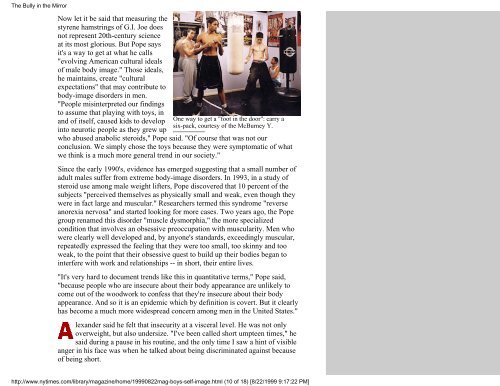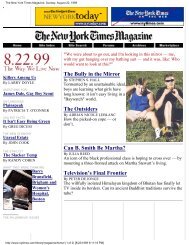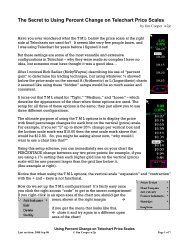The New York Times Magazine, Sunday, August 22, 1999
The New York Times Magazine, Sunday, August 22, 1999
The New York Times Magazine, Sunday, August 22, 1999
You also want an ePaper? Increase the reach of your titles
YUMPU automatically turns print PDFs into web optimized ePapers that Google loves.
<strong>The</strong> Bully in the Mirror<br />
Now let it be said that measuring the<br />
styrene hamstrings of G.I. Joe does<br />
not represent 20th-century science<br />
at its most glorious. But Pope says<br />
it's a way to get at what he calls<br />
"evolving American cultural ideals<br />
of male body image." Those ideals,<br />
he maintains, create "cultural<br />
expectations" that may contribute to<br />
body-image disorders in men.<br />
"People misinterpreted our findings<br />
to assume that playing with toys, in<br />
and of itself, caused kids to develop One way to get a "foot in the door": carry a<br />
six-pack, courtesy of the McBurney Y.<br />
into neurotic people as they grew up<br />
who abused anabolic steroids," Pope said. "Of course that was not our<br />
conclusion. We simply chose the toys because they were symptomatic of what<br />
we think is a much more general trend in our society."<br />
Since the early 1990's, evidence has emerged suggesting that a small number of<br />
adult males suffer from extreme body-image disorders. In 1993, in a study of<br />
steroid use among male weight lifters, Pope discovered that 10 percent of the<br />
subjects "perceived themselves as physically small and weak, even though they<br />
were in fact large and muscular." Researchers termed this syndrome "reverse<br />
anorexia nervosa" and started looking for more cases. Two years ago, the Pope<br />
group renamed this disorder "muscle dysmorphia," the more specialized<br />
condition that involves an obsessive preoccupation with muscularity. Men who<br />
were clearly well developed and, by anyone's standards, exceedingly muscular,<br />
repeatedly expressed the feeling that they were too small, too skinny and too<br />
weak, to the point that their obsessive quest to build up their bodies began to<br />
interfere with work and relationships -- in short, their entire lives.<br />
"It's very hard to document trends like this in quantitative terms," Pope said,<br />
"because people who are insecure about their body appearance are unlikely to<br />
come out of the woodwork to confess that they're insecure about their body<br />
appearance. And so it is an epidemic which by definition is covert. But it clearly<br />
has become a much more widespread concern among men in the United States."<br />
lexander said he felt that insecurity at a visceral level. He was not only<br />
overweight, but also undersize. "I've been called short umpteen times," he<br />
said during a pause in his routine, and the only time I saw a hint of visible<br />
anger in his face was when he talked about being discriminated against because<br />
of being short.<br />
http://www.nytimes.com/library/magazine/home/<strong>1999</strong>08<strong>22</strong>mag-boys-self-image.html (10 of 18) [8/<strong>22</strong>/<strong>1999</strong> 9:17:<strong>22</strong> PM]






